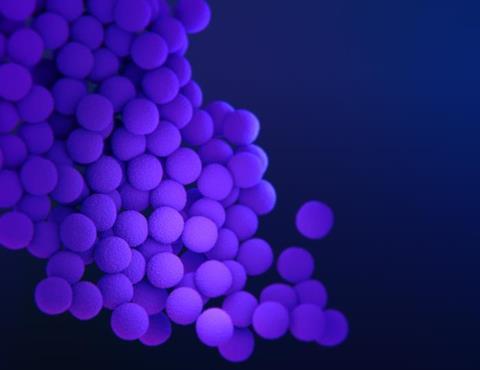A new spa type of Staphylococcus aureus has emerged in Jordan which has been identified as the primary cause of dairy cow mastitis in the region.
Research by a team at Jordan University of Science and Technology has identified this novel spa type for the first time, and is outlined in the paper ’Novel spa type and antimicrobial resistance gene profiles of Staphylococcus aureus strains isolated from bovine mastitis in Jordan’ which appears in Letters in Applied Microbiology, an Applied Microbiology International publication.
The researchers now advise testing workers to investigate the possibility of zoonotic transmission.
Bovine mastitis project
“This project was conducted as part of our laboratory’s research on the effective treatment of bovine mastitis,” says corresponding author Dr. Mohammad Hamdi Gharaibeh.

“In this study, milk samples were collected from 37 farms located in two districts in Jordan: Zarqa (Dhlail region) in the northeast and Irbid in the northwest. The sampling period was from June 2016 to September 2016.
“The purpose of this study was to isolate S. aureus, identify resistance genes, and identify the spa type. In order to determine the most effective treatment for cows, it is essential to determine resistance genes and spa types.
Novel spa type
“Consequently, it contributes significantly to reducing pathogen transmission. Six spa types were identified from an analysis of 21 isolates, five of which were previously known. As a result of this study, a novel spa type (t17158) was identified as the primary cause of dairy cow mastitis in Jordan, marking the first report of its presence in Jordan and worldwide to date.”
S. aureus possesses a variety of detrimental characteristics which significantly impact host immunity, so it is able to evade the host’s immune defence mechanisms and exhibit resistance to a wide range of drugs, contributing to its pathogenesis.
The increase in antimicrobial resistance in S. aureus poses a significant challenge in dairy animal production as well as a public health concern due to its high resistance to commonly used antibiotics and the presence of multidrug-resistant strains such as MRSA.
Transmission of pathogens
“This study aimed to determine the Spa types of S. aureus and evaluate the resistance genes profile of isolates from dairy farms in Jordan. The results of this study can be used to determine the most effective treatments for cows and have a significant impact on reducing the transmission of pathogens,” Dr Gharaibeh said.
S. aureus was isolated from milk samples obtained from bovines with subclinical mastitis. The identification process involved confirming and detecting resistance genes, spa typing, sequencing, and subsequent analysis.
In an analysis of S. aureus isolates, antimicrobial resistance genes were found to be prevalent, ranging from 15% in the aph(3′)-III gene to 100% in the tetK gene.
IDing MRSA isolates
In order to identify MRSA isolates, the mecA gene was detected in S. aureus isolates. There were 32 isolates found to carry the gene from 14 farms, resulting in a herd prevalence rate of 38 percent. Interestingly, a significant difference (P>0.05) was found between Irbid (28.1%) and Zarqa (6.5%).
Additionally, Irbid displayed a higher prevalence of aph(3′)-III than Zarqa. In contrast to Irbid, Zarqa had significantly higher levels of aph(3’)-III, aac(6’)/aph(2”), and ant(4’)-Ia genes (P>0.05).
A total of 21 S. aureus isolates were selected for further analysis. Among these isolates, six distinct spa types were observed, varying in repeat length from 2 to 11. Five of these types were previously known [t386 (n=4), t524 (n=2), t17426 (n=2), t17427 (n=1), and t1339 (n=1)], and one was reported for the first time [t17158 (n=11)]. Based on this finding, t17158 and its related types (t17426 and t17427) are the predominant causative agents of bovine mastitis in Jordan.
Primary cause of mastitis
“Based on the findings of this study, a novel spa type, t17158, appears to be the predominant type responsible for mastitis cases in Jordan,” Dr Gharaibeh said.
“Moreover, the emergence of this spa type demonstrates its potential importance for bovine health. A number of the S. aureus isolates exhibited substantial resistance to penicillin and tetracycline, with resistance genes associated with these antibiotics prevalent in the isolates.
“In light of this resistance, commonly used antibiotic classes are less effective in treating bovine mastitis. There are also concerns regarding public health implications associated with the presence of MRSA isolates among S. aureus strains. In dairy cow populations, these isolates may serve as reservoirs for antibiotic-resistant bacteria.”
Significant discovery
What surprised Dr Gharaibeh was the identification of novel spa types in this study, representing a significant discovery.
“One particular novel type, t17158, emerged as a prominent type responsible for mastitis. The presence of this novel spa type highlights its potential impact on bovine health,” he said.
“Future studies will be required to determine whether MRSA strains isolated from workers’ nasals are related genetically to isolates from cattle. This will be done by analysing their molecular characterization using PFGE, MLST, spa, SCCmec, and agr typing.
Zoonotic transmission
“In this way, LA-MRSA isolates from contaminated bovine milk will be able to be investigated for the possibility of zoonotic transmission. Further, based on the results of this study, the main cause of mastitis in dairy cows in Jordan has been identified as a novel new spa type (t17158).
“These results will be crucial for the rational design and use of vaccines against S. aureus mastitis in Jordan in the future.”
This project was conducted as part of the laboratory’s research into bovine mastitis treatment. This part of the project was a master’s thesis for Sulieman Mashaqbah under the supervision of Dr. Mohammad Gharaibeh and Dr. Luay Abu-Qatouseh. Farah Al- Qudsi (research assistant) and Shehab-Aldeen Assaf (student)also participated in the study.
Last but not least, the team would like to acknowledge the financial support provided by the Deanship of Research at Jordan University of Science and Technology.
’Novel spa type and antimicrobial resistance gene profiles of Staphylococcus aureus strains isolated from bovine mastitis in Jordan’ appears in Letters in Applied Microbiology.







No comments yet